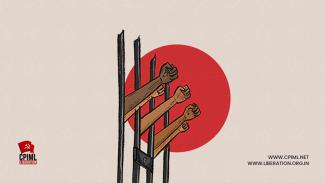Smothering dissent and civil liberties has become one of the striking hallmarks of the Modi government’s nine years of fascist rule in India. Today, there are rarely any democratic rights movements, where the protestors have not been slapped with a plethora of cases, extending from draconian laws like Unlawful Activities Prevention Act and sedition. No farmer, worker, activist, journalist, lawyer or artist can assume safety against the crackdown on their civil liberties.
Father Stan Swamy (26 April 1937- 5 July 2021), a democratic rights activist who died in jail after long and unjust incarceration once said, “What is happening to me is not something unique, happening to me alone. It is the broader process that is taking place all over the country.… Prominent intellectuals, lawyers, writers, poets, activists, student leaders. They are all put into jail because they have expressed their dissent or raised their questions about the ruling powers of India.”
The cruelty with which the government treats its critics speaks of the unbridled emergency the country is facing. The government has adopted all forms of illegal and anti-democratic methods, including military grade surveillance, fabricating and planting evidences, and the use of rudimentary forms of torture in its quest to throttle the voices that defend democratic and constitutional values of the country.
Since the BJP’s rise to power in 2014, numerous human rights activists, lawyers, journalists and students are being persecuted both for their identity and their commitment to fight for democratic and progressive rights. From the arrests pertaining to Bhima Koregaon in 2018, the anti-CAA in 2020, to the recent arrests of activist Teesta Setalvad and journalist Mohammad Zubair, the current regime is bent on imprisoning any person who speaks the uncomfortable truths and exposes the lies of the BJP-Sangh. Whether it is the arrests of Umar Khalid, who is facing incarceration for over 1,000 days, or those of anti-CAA activists like Gulfisha Fatima in cooked-up criminal charges of the Delhi riots, or Anand Teltumbde, Prof. Hany Babu, Gautam Navlakha and others in the Bhima Koregaon case, the one common feature is the draconian UAPA under which bail is a rare possibility.
Of course, Varavara Rao was given bail by the Supreme Court on medical grounds, despite the same being denied to Fr. Stan Swamy, who died in custody even while his health was failing. Political prisoners are denied basic amenities such as mosquito nets and telephone facilities. Former DU Professor GN Saibaba, who is wheelchair-bound, was denied woollen cap, napkins and stationery materials.
For long, it has been said that the worst of Indian state excesses are tried, tested and perfected in Kashmir, only after which the same is executed across the country. We see the pattern with these political arrests. Over 5,000 Kashmiris were arrested following the Modi government’s decision to abrogate Article 370. Politicians, lawyers, businesspeople, activists and journalists across the valley were thrown in far-flung jails or kept under house arrest. At the latest count, around 261 prisoners belonging to J&K are currently lodged in different jails of Uttar Pradesh and Haryana. In November 2021, Khurram Parvez, a noted human rights activist from Jammu Kashmir Coalition of Civil Society (JKCCS), which is a group based in Srinagar which publishes regular reports on the human rights violations and excesses committed by security forces in the Valley, was arrested on accusations of "terror-funding". The National Investigation Agency (NIA) took charge and he was arrested under the draconian anti-terrorism law, making it impossible for him to get bail. Earlier this year, Kashmiri journalist Fahad Shah was detained under the Jammu and Kashmir Public Safety Act (PSA) on grounds that he had been “misguiding common masses by circulating fake news against the government and its policies”.
The pattern is clear. What is being criminalized are not mere actions, but any form of opposition to this government. The State cynically instrumentalises investigations and weaponises an already unjust criminal justice system to lock up anyone standing up against its unjust policies. Thus, the so-called investigations into the Delhi Riots, translates into targeting of anti-CAA activists and Bhima Koregaon becomes the avenue to target Dalit intellectuals, human right activists and lawyers. The extent to which this regime would go, is perhaps revealed in the arrest of Jignesh Mevani from Gujarat by the Assam police and the move of the Delhi Police in flying journalist Zubair from Bangalore to recover his laptop for merely putting out a tweet.
In addition to the use of legal means, the Modi government has extensively used surveillance software and unleashed enforcement agencies to intimidate critics. The Pegasus spying software, which the government imported from Israel, has been used to hack into the computers and plant fabricated documents on some of the arrested activists.
The Raids
The government uses the ED-CBI-Income Tax raids to create a spectacle of an anti-corruption crusade much like the announcement of demonetisation in November 2016, which was projected as a war on black money. Any organisation or critic, or even opposition party leaders, who speak against the Modi government, find the enforcement agencies paying them a visit. After an explosive exposé by the former J&K Governor Satyapal Malik regarding Modi government’s failure to prevent the Pulwama attack on a CRPF convoy, the CBI has been let loose on Malik.
Dr. Navsharan Singh, who played a vital role in the farmers’ protests against pro-corporate farm laws, noted activist and retired IAS officer Harsh Mander, and scores of activists and journalists continue to face harassment and intimidation by investigative agencies under the Modi regime.
The intimidations, raids and arrests are part of a vicious ploy by the Modi government to silence voices that challenge the ongoing communal-fascist onslaught in the country. The need of the hour is to unite and resist this saffron bulldozer of hate and violence that threatens to push India into the abyss of brutality.











